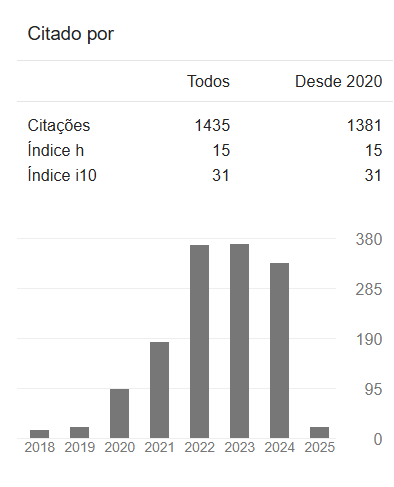THE FLIPPED CLASSROOM APPROACH IN MATHEMATICS CLASSES- TEACHER TRAINING IN THE ERA OF CYBERCULTURE
DOI:
10.23926/RPD.2526-2149.2018.v3.n1.p125-139.id189Keywords:
Flipped classroom approach, Teaching of Mathematics, Teacher trainingAbstract
The purpose of this paper is to present an experiment with the Flipped classroom approach, combined with Facebook, as educational practice in teacher training. Our aim was to provide undergraduate students of Pedagogy with the experience of a differentiated teaching practice, based on the principles of the Flipped classroom approach, along with Facebook use. The potential and challenges of such experience have been analyzed, in relation to initial teacher training. As theoretical foundations, our paper is based on studies by Bergmann & Sams (2016), Bruno & Pesce (2012), Borba (1999), Bairral (2013) and Schlemmer (2006), who address the Flipped classroom approach, the teaching of Mathematics and Digital ICT (Digital Information and Communications Technologies). Our study - of exploratory type - was conducted with 38 students enrolled in the subject "Knowledge and Methods in the Teaching of Mathematics 1". The approach was qualitative and the data were collected by means of semi-structured interviews answered by students. Our findings show that it was useful to work with the Flipped classroom approach in initial teacher training, as it propelled a reflection on the importance of such approach and on the need to develop pedagogical practices that can successfully deal with the specifiities of the teaching of Mathematics, and that can be superior to the current educational paradigm, being closer to the context of the subjects at the same time.
Downloads
Metrics
No metrics found.
References
ALMEIDA, M. E.; VALENTE, J. A. Tecnologias e currículo: trajetórias convergentes ou divergentes? São Paulo: Paulus, 2011.
AMANTE, L. Facebook e novas possibilidades. In: PORTO, C.; SANTOS, E. (Org.) Facebook e educação: publicar, curtir, compartilhar. Campina Grande: EDUEPB, 2014. p. 27-46. DOI: https://doi.org/10.7476/9788578792831.0003
BAIRRAL, M. A. Do clique ao touchscreen: novas formas de interação e de aprendizado matemático. In: 36ª REUNIÃO NACIONAL DA ANPED, 2013, Goiânia. Anais... Goiânia: Campus Samambaia/UFG, 2013. GT 19 – Educação Matemática, p. 1-18.
BECKER, F. Aprendizagem: concepções contraditórias. Schème: Revista Eletrônica de Psicologia e Epistemologia Genéticas, Marília, v. 1, n. 1, p. 53-73, jan./jun. 2008. Disponível em: <http://www2.marilia.unesp.br/revistas/index.php/scheme/article/viewFile /552/445>. Acesso em: 20 mar. 2018. DOI: https://doi.org/10.36311/1984-1655.2008.v1n1.p53-73
BERGMANN, J.; SAMS, A. Sala de aula invertida: uma metodologia ativa de aprendizagem. Rio de Janeiro: LTC, 2016.
BORBA, M. C. Tecnologias informáticas na educação matemática e reorganização do pensamento. In: BICUDO, M. A. V. (Org.). Pesquisa em educação matemática: concepções & perspectivas. São Paulo: Unesp, 1999. p.285-295.
BRUNO, A, R.; PESCE, L. Mediação compartilhada, dialogia digital e letramentos: contribuições para a docência na contemporaneidade. Atos de Pesquisa em Educação: PPGE/ME FURB, Blumenau, v. 7, n. 3, p. 683-706, set./dez. 2012. Disponível em: <http://proxy.furb.br/ojs/index.php/atosdepesquisa/article/viewFile/3461/217>. Acesso em: 03 abr. 2018.
FLICK, Uwe. Uma introdução à pesquisa qualitativa. 2ª ed. Porto Alegre: Bookman, 2004.
MORAES, R.; GALIAZZI, M. do C. Análise textual discursiva. 2. ed. rev. Ijuí: Ed. Unijuí, 2013.
MORAN, J. M. Nova personalidade [25 out. 2014]. Brasília: Correio Braziliense. Brasília. Entrevista concedida para Olivia Meireles. Disponível em: <http://www2.eca.usp.br/moran/wp-content/uploads/2014/01/Jos%C3%A9-Moran.pdf>. Acesso em: 01 abr. 2018.
SCHLEMMER, E. O trabalho do professor e as novas tecnologias. Revista Textual. Porto Alegre: Sinpro, v.1, n.1, p. 33-42, nov. 2006.
VALENTE, J. A. Aprendizagem Ativa no Ensino Superior: a proposta da sala de aula invertida. Departamento de Multimeios, Nied e GGTE. Unicamp & Ced/ PUC, São Paulo, 2014. Disponível em: <http://www.pucsp.br/sites/default/files/img/aci/27-8_agurdar_proec_textopara280814.pdf>. Acesso em: 30 mar. 2018.
Downloads
Published
How to Cite
Issue
Section
License
Copyright (c) 2023 A Revista Prática Docente tem o direito de primeira publicação

This work is licensed under a Creative Commons Attribution-NonCommercial 4.0 International License.
Authors who publish in this journal agree to the following terms:
- Authors retain the copyright and grant the journal the right of first publication, with the paper simultaneously licensed under the Licença Creative Commons Attribution allows the sharing of the work with acknowledgment of authorship and initial publication in this journal.
- Authors are authorized to take additional contracts separately, for non-exclusive distribution of the version of the work published in this journal (e.g. publish in institutional repository or as a book chapter), with acknowledgment of authorship and initial publication in this journal.











